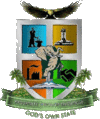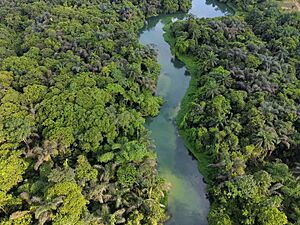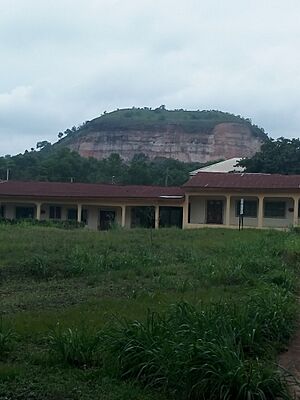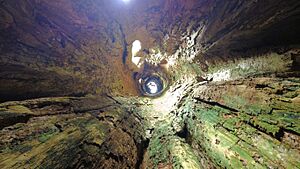Abia State facts for kids
Quick facts for kids
Abia
|
|||
|---|---|---|---|
|
State
|
|||
| Abia State | |||
|
|||
| Nicknames:
God's Own State
Igbo: Ọ̀hà nke Chineke |
|||
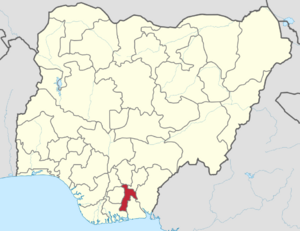
Location of Abia State in Nigeria[
|
|||
| Country | |||
| Date created | 27 August 1991 | ||
| Capital | Umuahia | ||
| Government | |||
| • Body | Government of Abia State | ||
| Area | |||
| • Total | 6,320 km2 (2,440 sq mi) | ||
| Area rank | 32 | ||
| Population
(2022 est)
|
|||
| • Total | 4,143,100 | ||
| • Density | 655.6/km2 (1,697.9/sq mi) | ||
| Demonym(s) | Abians | ||
| GDP (PPP) | |||
| • Year | 2021 | ||
| • Total | $22.83 billion 18th of 36 |
||
| • Per capita | $5,351 9th of 36 |
||
| Time zone | UTC+01 (WAT) | ||
| Postal code |
440001
|
||
| Dialing Code | +234 | ||
| ISO 3166 code | NG-AB | ||
| Language | Igbo English Ibibio |
||
| HDI (2021) | 0.644 medium · 8th of 37 |
||
Abia State (which in Igbo is called Ọha Abia) is a state in the southeastern part of Nigeria. It is known as "God's Own State." The state is surrounded by other states like Anambra, Enugu, Ebonyi, Imo State, Cross River State, Akwa Ibom State, and Rivers State. Abia is special because it shares borders with all four other southeastern states in Nigeria.
The name "Abia" comes from the first letters of four important areas: Aba, Bende, Isuikwuato, and Afikpo. (Afikpo later became part of Ebonyi State in 1996). The capital city of Abia State is Umuahia, and its biggest city and business hub is Aba.
Abia is the 32nd largest state in Nigeria by land area and the 27th most populated. It has an estimated population of over 3.7 million people as of 2016. The state has different types of land, from swampy forests in the south to drier forests and some grasslands in other parts. Important rivers like the Imo and Aba Rivers flow along its borders.
For many years, different groups of people have lived in what is now Abia State, but most of them are from the Igbo people. Before Nigeria became independent, this area was part of the Aro Confederacy. After the British defeated the Aro Confederacy in the early 1900s, Abia became a place where people resisted colonial rule, like during the Women's War that started in Oloko.
After Nigeria gained independence in 1960, Abia was part of the Eastern Region. It later became part of the East Central State. During the Nigerian Civil War (1967-1970), Abia was part of the breakaway state of Biafra. After the war, Abia was part of Imo State until 1991, when it became its own state. In 1996, a small part of Abia was used to help create the new Ebonyi State.
Abia State's economy mainly relies on producing crude oil and natural gas. Farming is also very important, with crops like yams, maize, taro, oil palm, and cassava. The city of Aba has many medium-sized factories that make things. Because its population and industries are growing fast, Abia has one of the highest Human Development Index scores in Nigeria, ranking 8th out of 37 states.
Contents
Geography
Abia State covers about 4,902 square kilometers. It shares borders with Enugu and Ebonyi states to the north and northeast. To the east and southeast, it borders Cross River State and Akwa Ibom State. Rivers State is to the south and west, while Imo State and Anambra are to the west.
The very southern part of Abia State is covered by Niger Delta Swamp Forests. The rest of the state has drier forests and some grasslands. The southern area gets a lot of rain, about 2,400 millimeters (94 inches) each year, mostly from April to October. The main rivers in Abia State are the Imo and Aba Rivers, which flow into the Atlantic Ocean.
Environmental Issues
Managing Waste
Managing solid waste means collecting, storing, treating, and getting rid of trash safely. This is important so that waste doesn't harm people, animals, or the environment. The amount of waste produced in a place can depend on things like how much money people earn, the local weather, and how much the area is developing.
In Aba, Abia State, waste is sorted into different types:
- Waste from homes, food places, markets, and shops.
- Waste from factories (but not dangerous toxic waste).
- Waste from government buildings, schools, hospitals, and parks.
Recently, it was reported that Aba and Umuahia produce about 270 truckloads of household and business waste every day. This was shared by Governor Alex Otti when he became governor.
Climate
Aba has a warm and often cloudy wet season and a hot, sometimes hazy dry season. The weather is generally warm all year. Temperatures usually stay between 20°C (68°F) and 31°C (88°F). It rarely gets colder than 16°C (61°F) or hotter than 33°C (91°F).
The best time to visit Aba for outdoor activities in warm weather is from late November to early February. During the rainy season, it's warm and cloudy. The dry season is hot and often hazy.
History and Population
Abia State is one of Nigeria's 36 states. It has 17 Local Government Areas (LGAs). The state was created on August 27, 1991, by General Ibrahim Babangida. It is located in the southeastern part of Nigeria and was formed from part of Imo State. Abia State is also part of the Niger Delta region.
The capital is Umuahia, and the main commercial city is Aba. Abia State is often called "God's Own State." The name "Abia" is a short form of four important areas: Aba, Bende, Isuikwuato, and Afikpo.
Most of the people in Abia State (about 95%) are Igbo people. Their traditional language, Igbo, is widely spoken. Ibibio is spoken by a smaller group, especially in Arochukwu. English is also widely used for government and business. Most people in Abia State, over 3 million, are Christians.
Economy and Resources
Producing crude oil and natural gas is a very important activity in Abia State, making up over 39% of the state's economy. There are many oil wells and gas plants in the state.
The manufacturing sector, which includes making things like textiles, medicines, soap, plastics, cement, footwear, and cosmetics, is mainly found in Aba. The state government has also built a large International Conference Centre in Umuahia to help with tourism and boost the economy.
Farming is the second most important part of Abia's economy, employing 70% of the state's workers. With good rainfall, Abia has lots of land for growing crops. Farmers grow yams, maize, potatoes, rice, cashews, plantains, taro, and cassava. Oil palm is the most important crop grown for selling.
Oil and Gas Exploration
Abia State has over 100 oil wells and 3 working oil stations. There is also a gas plant. In 2012, 42 oil wells were returned to Abia from Rivers State, which could make Abia the fourth largest oil-producing state in Nigeria. Big oil companies like Shell hold most of the licenses for the wells here.
The state produces about 36,000 barrels of crude oil every day. Even with this production, the state has sometimes faced challenges with getting enough money from its share of oil revenue from the federal government.
Raw Materials in Abia State
Besides oil and gas, Abia State also has other valuable minerals:
- Gold
- Lead/Zinc
- Limestone
- Salt
- Kaolin
Universities and Colleges
Abia State is home to several universities and colleges:
- Michael Okpara University of Agriculture in Umudike (federal)
- Abia State University in Uturu (state-owned)
- Gregory University in Uturu (private)
- Rhema University in Aba (private)
- Spiritan University in Umu Nneochi (private)
- Clifford University in Owerrinta (private)
- Nigerian British University in Asa (private)
Other higher learning places include:
- Uma Ukpai Polytechnic, Asaga-Ohafia
- Abia State College of Education (Technical) in Arochukwu
- Abia State College Of Health Sciences and Management Technology in Aba
- Temple Gate Polytechnic in Aba
- Abia State Polytechnic
- National Institute for Nigerian Languages, Aba (a federal center for studying Nigerian languages)
Transportation
The closest airport to Abia State is Sam Mbakwe Cargo Airport (Owerri Airport), which is about an hour's drive to Umuahia and Aba. Port Harcourt International Airport is about two hours away. Akwa Ibom Airport can also be used by visitors.
Rail transport is also available and useful in the state. Aba is connected to Port Harcourt by rail. Umuahia is connected to Aba and Enugu by rail. The parts of the state near the coast can also be reached using boats and canoes.
Major roads in Abia State include:
- A3 going northeast from Port Harcourt through Umuahia to Enugu State.
- F103 going east from Akwa Ibom.
- F104 from Aba through Azumini.
- F107 from Umuahia through Bende to Ohafia.
- F108 from Arochukwu.
- F112, the Okigwe-Afikpo road, going east from Imo State to Ebonyi State.
Religion
Most people living in Abia State are Christians.
Churches
The Catholic Church has two main areas in Abia: the Umuahia Diocese (started in 1958) with 70 churches, led by Bishop Michael Kalu Ukpong, and the Aba Diocese (started in 1990) with 90 churches, led by Bishop Augustine Ndubueze Echema. Both are part of the Owerri Archdiocese.
The Anglican Church in Nigeria also has a large presence, with the Aba Province led by Archbishop Isaac Nwaobia. This province includes nine different Anglican Dioceses within Abia State, each with its own bishop.
Languages
Here are the languages spoken in different Local Government Areas (LGAs) of Abia State:
| LGA | Languages |
|---|---|
| Arochukwu | Igbo, Ibibio |
| Umuahia South | Igbo |
| Umuahia North | Igbo |
| Ikwuano | Igbo |
| Isuikwuato | Igbo |
| Ukwa West | Igbo |
| Aba South | Igbo |
| Aba North | Igbo |
| Isiala Ngwa North | Igbo |
| Isiala Ngwa South | Igbo |
| Obingwa | Igbo |
| Umunneochi | Igbo |
| Ugwunagbo | Igbo |
| Ukwa East | Igbo |
Electoral System
The way leaders are chosen in each state uses a special voting system. To win in the first round, a candidate needs to get the most votes overall and also get more than 25% of the votes in at least two-thirds of the state's Local Government Areas. If no candidate meets these rules, a second round of voting is held. In the second round, the top candidate from the first round competes against the candidate who got the most votes in the highest number of LGAs.
Traditional Rulers
Traditional rulers are important leaders in their communities in Abia State. They often help keep peace and traditions alive. Here are a few examples:
| Title | Ethnic Group | Name | LGAs |
|---|---|---|---|
| Eze OHA 4th of Aba | Ngwa | Raymond D Ogbonna | Aba South |
| Oru 1 of Oru Onyerubi | Igbo / Oboro | Eze Ralph Ukachi Ogbonna | Ikwuano |
| Eze Aro | Igbo / Arochukwu | Mazi Ogbonnaya Vincent Okoro (Eze Aro III) | Arochukwu |
| Eze Ukwu 1 Ngwa-Ukwu | Ngwa | Benard Enweremadu | Isiala Ngwa |
| Enachioken Abiriba | Igbo / Abiriba | Kalu Kalu Ogbu | Ohafia |
Culture and Tourism
Abia State has many interesting places and traditions to explore:
- Arochukwu, a historic town.
- The beautiful Azumini Blue River.
- The Amakama wooden cave, which is a hollow tree big enough for about twenty people.
- Natural caves found in the northern parts of the state, from Umunneochi to Arochukwu.
- Many traditional festivals and dances.
- The National War Museum, Umuahia and the Ojukwu Bunker in Umuahia, which tell stories of Nigeria's history.
- The Museum of Colonial History in Aba.
- "Akwete" cloth weaving, a special type of fabric made in Ukwa-East LGA.
- The famous Ohafia War Dancers.
- The Amafor-Isingwu biannual Iza aha ceremony.
- The Ekpe Festival in Umuahia.
Notable People
Abia State has produced many famous people who have made a difference in different fields. Here are a few:
- Adaobi Tricia Nwaubani – a well-known novelist and writer.
- Alex Otti – a banking expert and the current Governor of Abia State.
- Alvan Ikoku – an important educationist (someone who studies and teaches about education).
- Arunma Oteh – a former Vice President and Treasurer at the World Bank.
- Azubuike Ihejirika – a former Chief of Army Staff in Nigeria.
- Basketmouth – a very popular comedian.
- Chika Chukwumerije – an Olympic Taekwondo medalist and the first Black African Olympic medalist in martial arts.
- Chinedu Ikedieze – an award-winning Nollywood actor.
- Chinyere Kalu – Nigeria's first female pilot.
- Dike Chukwumerije – an award-winning novelist, poet, and public speaker.
- Ebitu Ukiwe – a former Military Vice President of Nigeria.
- Emmanuel Acho – a former American Football Player and now a sports analyst.
- Eni Njoku – the first Vice Chancellor of the University of Lagos.
- Enyinnaya Abaribe – a Senator and former Deputy Governor.
- Jaja Wachuku – Nigeria's first Minister of Foreign Affairs and first Nigerian representative to the UN.
- Johnson Aguiyi-Ironsi – a former Head of State of Nigeria.
- Kalu Idika Kalu – a former Finance Minister.
- Michael Okpara – a premier (leader) of Nigeria's Eastern Region from 1959 to 1966.
- Mr Raw – a pioneer of Igbo rap music.
- Nwankwo Kanu – a famous Nigerian professional footballer and Arsenal FC legend.
- Oluchi Onweagba – an international model and the first winner of M-Net Face of Africa.
- Orji Uzor Kalu – a former State Governor and a Senator.
- Samuel Chukwueze – a professional football player for the Nigeria National Team.
- Uche Jombo – an award-winning Nollywood actress.
- Uche Chukwumerije – a former Senator and Minister of Information.
- Uzodinma Iweala – a US-based medical doctor and author of the book Beasts of No Nation.
See also
 In Spanish: Estado de Abia para niños
In Spanish: Estado de Abia para niños
 | Victor J. Glover |
 | Yvonne Cagle |
 | Jeanette Epps |
 | Bernard A. Harris Jr. |



